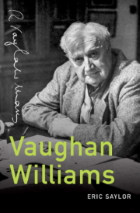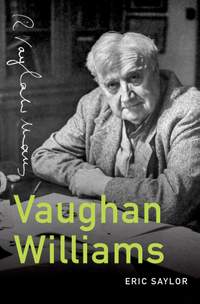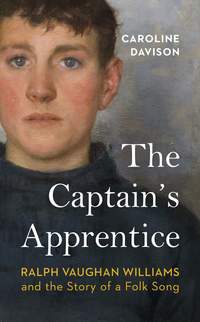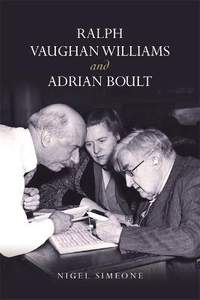Book Review,
Eric Saylor's biography of Ralph Vaughan Williams
 2022 was the 150th anniversary of the birth of English composer Ralph Vaughan Williams, and as such it saw a small flurry of activity on the book publishing front, with the appearance of several volumes devoted to exploring his life and music. Among these, there was one that stood out for us, so much so that we picked it as one of our Top Five Books of the Year in our recent Presto Music Awards 2022. This was Eric Saylor's biography of the composer, the latest entry in Oxford University Press's series of composer biographies, Master Musicians.
2022 was the 150th anniversary of the birth of English composer Ralph Vaughan Williams, and as such it saw a small flurry of activity on the book publishing front, with the appearance of several volumes devoted to exploring his life and music. Among these, there was one that stood out for us, so much so that we picked it as one of our Top Five Books of the Year in our recent Presto Music Awards 2022. This was Eric Saylor's biography of the composer, the latest entry in Oxford University Press's series of composer biographies, Master Musicians.
This new biography sees Vaughan Williams not just through affectionate, nostalgic eyes as an English phenomenon and beloved character in the nation’s cultural story, but as a multi-faceted composer fully plumbed in to the currents of musical life around the world.
Saylor picks up on a number of running themes throughout Vaughan Williams’s life that rarely receive such emphasis – his non-conformist upbringing in a setting influenced by connections to Wedgwood and Darwin is made clear early on and resurfaces several times. An interest in Whitman’s poetry and radical politics accentuates Vaughan Williams the internationalist, at the expense of a perhaps parochial emphasis on his Englishness. Similarly, in the 1930s his own politics (clearly shaped by the socialism of William Morris) come to the fore, with the composer having lent significant humanitarian support from his considerable inherited wealth to those working with refugees fleeing that century’s fascist invaders. He emerges, too, as an early advocate for women composers, in particular Peggy Glanville-Hicks, Elizabeth Maconchy and Rebecca Clarke.
Clarke herself forms a kind of bridge to another area which again Saylor places greater emphasis on than usual – Vaughan Williams’s interest in the emerging early music scene. His involvement in the Palestrina Society (at Clarke’s request) and his introduction of Tudor hymn-tunes into the New English Hymnal are presented as significant and consequential, as is his career as a conductor and in particular his approach to Bach’s Passions with the Bach Choir.
Even away from early music per se, the breadth of Vaughan Williams’s compositional achievements emerges clearly from Saylor’s account. He pays attention to the earliest works, treating them as respectable pieces in their own right rather than merely sketches and trial runs for the “real” Vaughan Williams. His helpful approach of dividing the book into pairs of chapters (with a biographical treatment of a period in the composer’s life followed by an assessment of the major works from the same years) assists greatly with this re-balancing of our view of him. Strikingly, his period of study with Ravel – so often seen as pivotal in shaping his orchestral style – is barely mentioned, and Saylor takes care to mention that Vaughan Williams had already been interested in musical impressionism long before his trip to Paris.
The same broad assessment applies to Vaughan Williams’s choral works, hymns, and works for community or amateur performance, as well as his latter film music – these are all given due weight rather than being dismissed as afterthoughts to the core concert works. Conversely, the folk-song element of the Vaughan Williams kaleidoscope is rather less prominent here than popular perception would expect; his first encounter with a local folk-singer is vividly described but so too is an initial ambivalence about folk-song’s role.
Amid the intertwined stories of Vaughan Williams the composer, the writer, the philanthropist and more, Vaughan Williams the man makes welcome appearances from time to time, as one would expect – his lifelong insecurity and search for approval (notably withheld by Stanford in his youth), his deep and long-lasting friendship with Gustav Holst, and his efforts to hold onto his idealistic principles in the wake of the shattering experience of the First World War. His relationships with Adeline and Ursula are also treated sensitively and non-judgmentally.
It’s sometimes said that only Nixon could have gone to China – and Saylor’s view from across the pond makes me wonder if it took an American, or at least a non-Brit, to appraise Vaughan Williams even-handedly from an appropriate distance. “Iconoclastic” is far too strong a word, but Saylor has evidently set out to present a full, rounded and complex picture of this easily-stereotyped composer, and the results are engaging, detailed and absorbing.
Drawing upon both recent scholarship and newly-accessible scores and correspondence, this book interweaves an exploration of Vaughan Williams's life - including new insights about his early career, military service in the Great War, and relationships with the women he loved and married - with chapters surveying his enormous body of music, spanning hymn tunes to operas, keyboard etudes to solo concerti, wind band music for amateurs to perhaps the finest symphonic cycle of the twentieth century.
Available Format: Book
Other books on Vaughan Williams published in 2022
The Captain's Apprentice: Ralph Vaughan Williams and the Story of a Folk Song
Caroline Davison; Chatto & Windus; Hardback
In January 1905 the young Vaughan Williams visited King's Lynn, Norfolk, and heard an old fisherman perform 'The Captain's Apprentice', a brutal tale of torture sung to the most beautiful tune he had ever heard. With this transformational moment at its heart, this book traces the contrasting lives of the well-to-do composer and a forgotten King's Lynn cabin boy who died at sea, bringing fresh perspectives on Edwardian folk-song.
Available Format: Book
From 1918 onwards, Adrian Boult became one of Vaughan Williams's most important interpreters, giving the world premieres of the Pastoral, Fourth and Sixth Symphonies. As this book shows, Boult's scores include numerous annotations derived from conversations and correspondence with Vaughan Williams. The evidence of these scores is considered alongside extensive correspondence between the pair, Boult's private diaries, and other relevant documents including contemporary press reports.
Available Format: Book





